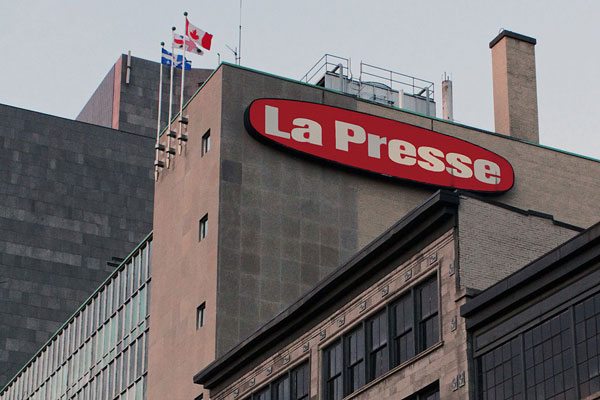
May 8, 2018; CBC News
While NPQ has long covered its growth in the US, the rise of nonprofit journalism in Canada has been slower. But that may be changing. One sign is that La Presse, a Montréal daily founded in 1884, which Steve Rukavina of the Canadian Broadcasting Corporation (CBC News) calls “a bastion of Quebec journalism,” indicated this week that it will become a nonprofit entity. Also, last week, the Globe and Mail, a paper which bills itself as “Canada’s national newspaper” (and has the largest circulation of any Canadian paper with a readership above 1.3 million), announced it would form a foundation to support its investigative projects, according to Edward Greenspon, its former editor-in-chief and current CEO of Public Policy Forum, based in Ottawa, the federal capital.
At La Presse, Rukavina writes, the shift to nonprofit ownership will help the French-language publication “accept private donations as well as government support.” The Desmarais family, which has owned the daily for more than 50 years, has said it will donate C$50 million to the new nonprofit. The family can afford to be generous; according to Canadian Business, the family is Canada’s seventh-wealthiest, with estimated total assets of C$8.338 billion.
With 585 employees, La Presse, notes Rukavina, has one of the largest newsrooms in Canada.
The daily has already gone through one major transition. Last December, it published its last print edition and went all-digital. However, its digital publication has more subscribers than its print edition ever did. According to Deputy Managing Editor Éric Trottier, “About 270,000 readers read La Presse + on their tablets each day, spending an average of 40 minutes browsing each edition…that compares with 25 minutes the typical print reader spends reading a newspaper.” The current daily digital readership is about 60,000 higher than its daily print readership of 210,000 when the paper began to develop its digital strategy in 2010.
Rukavina notes that at a press conference, La Presse president Pierre-Elliott Levasseur “urged the federal government to financially support the written press through philanthropic models and direct assistance.”
Sign up for our free newsletters
Subscribe to NPQ's newsletters to have our top stories delivered directly to your inbox.
By signing up, you agree to our privacy policy and terms of use, and to receive messages from NPQ and our partners.
While in the US, getting the federal government to support the local daily press would be unlikely, in Canada this is far less controversial. The Liberal government, which has an outright majority in Parliament, has already “proposed $50 million over five years to support independent, non-governmental organizations that will spur on local journalism in underserved communities,” Rukavina explains.
According to Levasseur, the daily’s adoption of a nonprofit model makes it easier for the government to justify using taxpayer dollars to support the media. After all, the government’s budget already provides C$675 million a year to support the CBC, Canada’s public broadcaster. Providing C$50 million over five years to boost local dailies is chump change by comparison. “They understand the important contribution that written media plays in a healthy democracy, but they’re not willing to help rich families or rich companies,” Levasseur says.
According to Rukavina, the Canadian federal budget also indicates that “the government will spend the next year exploring models that would allow private giving or philanthropic support for non-profit journalism and local news.”
For his part, Greenspon recommends that the federal government promote the formation of nonprofit media organizations by “allowing them to qualify as recipients for support from philanthropic foundations and, in some specific cases, become charities themselves.” Last year, a report from Greenspon’s Public Policy Forum group indicated that one reason to do so was that philanthropy-supported media are “less likely to support highly partisan and counterfeit stories, given the structures of foundations.”
As a financing model, Greenspon suggests that the government establish a levy similar to one that Canada assesses on cable companies to support domestic television and films. “We would like the government to set up a system like this, but get out of the way. We want as light and as short a touch as possible,” Greenspon says.—Steve Dubb













